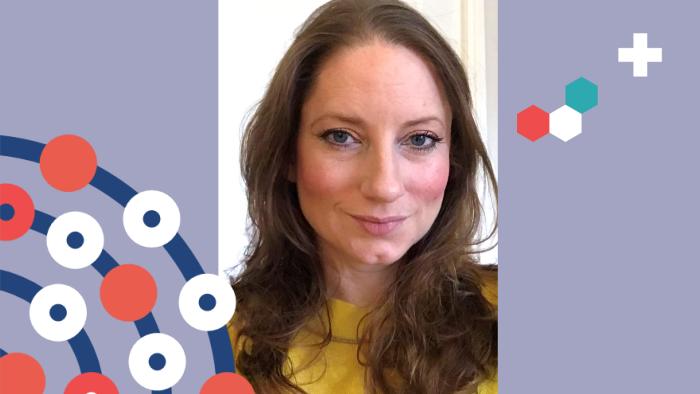For Mental Health Awareness Week, Dr Anna Moore shares how the Timely project is collaborating with young people to improve early identification of mental health problems, by linking health, social care and education data in new ways.

Dr Anna Moore is Principal Investigator of the Timely project in collaboration with ARC EoE and consultant psychiatrist at Cambridgeshire and Peterborough NHS Foundation Trust (CPFT).
I currently work academically as an assistant professor of child psychiatry and medical informatics in the University of Cambridge Department of Psychiatry, and clinically as a consultant in paediatric psychological medicine at CPFT. With the liaison psychiatry team, I’m setting up a specialist clinic for children with genetic disorders and mental health needs.
My research focus is developing digital solutions to identify young people’s mental health needs and personalise early care pathways. Routinely collected data can help to develop early identification tools based on artificial intelligence to use in clinical practice across community, social care and acute settings.
I have been working over the last four years to develop a database linking all information from children’s services and explore if AI tools can identify early mental health problems, to improve services and ensure people can be signposted to appropriate help as soon as possible. This is the basis of my research plan for the NIHR Clinical Lectureship and current assistant professorship, and Timely!
The Timely project
This research is supported by ARC EoE and CPFT and we are working on three key areas.
One is creating a theoretical framework to predict and identify mental health problems early, and understanding the risk factors that have the greatest effect in the first 20 years of life. particularly those that apply to underserved populations that need targeted support.
Secondly, we aim to create a database that links the health, education and social care data for all children in the region, which is the Child and Adolescent Data Resource (CADRE) to be based within the new Cambridge Children's Hospital. We have done extensive engagement work to involve the public in the governance of this data and establish what is acceptable, and we are taking it through all the necessary ethical approvals.
We also need to create rules for the data (algorithms) that apply all over the country for different ethnic groups in populations. We are working with Essex, Birmingham and Wales to figure out how to analyse across lots of different regions using ‘privacy preservice federated analytics’ to avoid any data bias. This is the first project to develop early identification models for community services like social care using linked data.
Finally, we have started to build prototype AI models using a unique linked dataset created for children in Wales. We used data from health, education and social care to create our first AI algorithm for children with social care contact. Multi-agency data is essential for building these tools, but we need to do more work on its accuracy before we can take it to the next stage of validation.
My long-term aim is to explore if genetic data can improve the accuracy of these models. Growing evidence shows us that there are genetic profiles that are associated with higher risk of developing mental health problems. I’m working with the NIHR BioResource to recruit the first national cohort of children to participate in genetic research projects which will provide helpful information.
Making the data from the Timely project available to researchers will help us understand better how integrated pathways work locally. The early identification tools will help us to identify children and young people in the community with a mental health problem sooner and direct them to the right support. We also hope to identify people who are at risk of severe side effects for some drugs, to improve their treatment.
"Designing the first clinical pathway to incorporate some of these tools, for the first specialist children’s hospital in the east of England - and first ever hospital to fully integrate physical and mental health - is exciting!"
Dr Anna Moore, Principal Investigator of the Timely project at ARC EoE
Working with young people and the public
This project has highlighted the need to increase participation and inclusion of children and young people in data research, as most work in this area has been with adults for their services. Working with the Anna Freud Centre, we have established a diverse community of around 200 young people and parents across the country who are helping us, and other similar child health research projects in future. This group is called CA:RING (Child and Adolescence: Research Involvement for the next Generation).
Public enthusiasm and support for the project has been incredible! We ran an in-depth programme of work last year over nine workshops, citizens’ juries and feedback sessions to understand any concerns people might have.
"It was really moving to hear from young people and parents how much they saw this could fundamentally improve things for them. People felt strongly that early identification was so important, that using data like this was a priority and they were frustrated that mental health was so far behind physical health services that already use data in this way."
Dr Anna Moore
We described in detail the data we’d be using and received a lot of support – in fact the main concern was whether the data we had would be very accurate, so people wanted to learn if they could make sure their data would be accurate enough. The need for equality emerged strongly – we really need to understand the context of the data and how it may mean different things in different communities and ethnic minorities, particularly groups that have been underserved by this kind of research and health services in general.
Next steps
A website is being built to share information, resources and updates on the project. I would love to hear from anyone who would like to get involved and join our CA:RING group for young people aged 11 to 15 years old and parents or guardians of children at any age. Health professionals can contact me at Anna.Moore@cpft.nhs.uk / am2708@medschl.cam.ac.uk if they would like to learn more about this research, and we also host students and placements so please get in touch to discuss opportunities to work with us!
